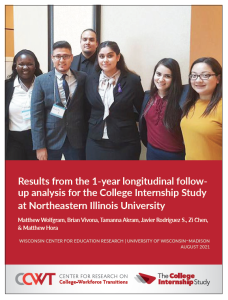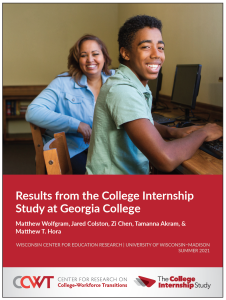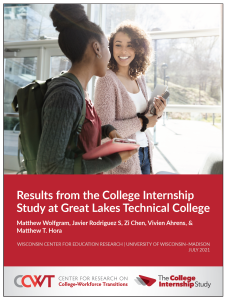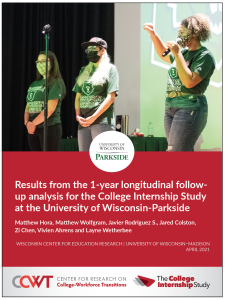Filter by Category:
Search
Year
- Category: Research Reports
- Clear Filters
 Wolfgram, M., Vivona, B., Akram, T., Rodríguez S., J., Chen, Z., & Hora, M. T. (2021). Results from the 1-year longitudinal follow-up analysis for the College Internship Study at Northeastern Illinois University. University of Wisconsin-Madison, Center for Research on College-Workforce Transitions.
Wolfgram, M., Vivona, B., Akram, T., Rodríguez S., J., Chen, Z., & Hora, M. T. (2021). Results from the 1-year longitudinal follow-up analysis for the College Internship Study at Northeastern Illinois University. University of Wisconsin-Madison, Center for Research on College-Workforce Transitions.
Summary: The College Internship Study examines the long-term impacts of internships on students’ lives and careers. Here, we highlight the findings from 177 survey responses and twelve interviews with students at Northeastern Illinois University (NEIU). They were conducted in the Fall of 2020 (Time 2 or T2), one year after the first round of data collection in 2019 (Time 1 or T1). This second round of the College Internship Study is guided by the following research question: What are the changes concerning students’ internship experiences and outcomes comparing longitudinal data at two points in time?
 Wolfgram, M., Colston, J., Chen, Z., Akram, T., & Hora, M. T. (2021). Results from the College Internship Study at Georgia College. University of Wisconsin-Madison, Center for Research on College-Workforce Transitions.
Wolfgram, M., Colston, J., Chen, Z., Akram, T., & Hora, M. T. (2021). Results from the College Internship Study at Georgia College. University of Wisconsin-Madison, Center for Research on College-Workforce Transitions.
Summary: This report includes findings from the first round of data collection (Spring 2020) at Georgia College for The College Internship Study, which is a national mixed-methods longitudinal study of internship programs conducted bythe Center for Research on College-Workforce Transitions (CCWT) at the University of Wisconsin-Madison (UW-Madison). The findings are based on an interdisciplinary sample of students who took an online survey (n = 329), interviews with students who have and who have not had an internship experience (n = 25) and an interview with one educator (n = 1).
 Wolfgram, M., Rodriguez S, J., Chen, Z., Ahrens, V., & Hora, M. (2021). Results from the College Internship Study at Great Lakes Technical College. University of Wisconsin-Madison, Center for Research on College-Workforce Transitions.
Wolfgram, M., Rodriguez S, J., Chen, Z., Ahrens, V., & Hora, M. (2021). Results from the College Internship Study at Great Lakes Technical College. University of Wisconsin-Madison, Center for Research on College-Workforce Transitions.
Summary: This report includes findings from the first round of data collection (Spring 2020) at Great Lakes Technical College (GLTC) for The College Internship Study, which is a national mixed-methods longitudinal study of internship programs conducted by the Center for Research on College-Workforce Transitions (CCWT) at the University of Wisconsin-Madison (UW-Madison). The findings are based on an campus-wide sample of students who took an online survey (n = 431), phone interviews with students who have and who have not had an internship experience (n = 22) and with career advisors, faculty, and employers (n = 6). We would like to thank GLTC for allowing our research team to conduct this study with your students, faculty and community members, and hope that our findings are useful as you work towards improving internships and work-based learning for your students
 Hora, M., Wolfgram, M., Rodriguez S., J., Colston, J., Chen, Z, Ahrens, V., & Wetherbee, L. (2021). Results from the 1-year longitudinal follow-up analysis for the College Internship Study at the University of Wisconsin-Parkside. University of Wisconsin-Madison, Center for Research on College-Workforce Transitions.
Hora, M., Wolfgram, M., Rodriguez S., J., Colston, J., Chen, Z, Ahrens, V., & Wetherbee, L. (2021). Results from the 1-year longitudinal follow-up analysis for the College Internship Study at the University of Wisconsin-Parkside. University of Wisconsin-Madison, Center for Research on College-Workforce Transitions.
Summary: This report includes findings from the second round of data collection (Spring 2019 or T2) at the University of Wisconsin-Parkside for The College Internship Study. The data collected at T2 include follow-up interviews with nine students and a follow-up online survey of 198 students who participated in the first round of data collection (Spring 2018 or T1). These data are analyzed to provide faculty, staff, and leadership at UW-Parkside with evidence-based insights about the impacts of internship participation on students’ lives and careers. This second round of the College Internship Study at UW-Parkside is guided by the following research question: What are the changes concerning students’ internship experiences and outcomes comparing longitudinal data at two points in time?
